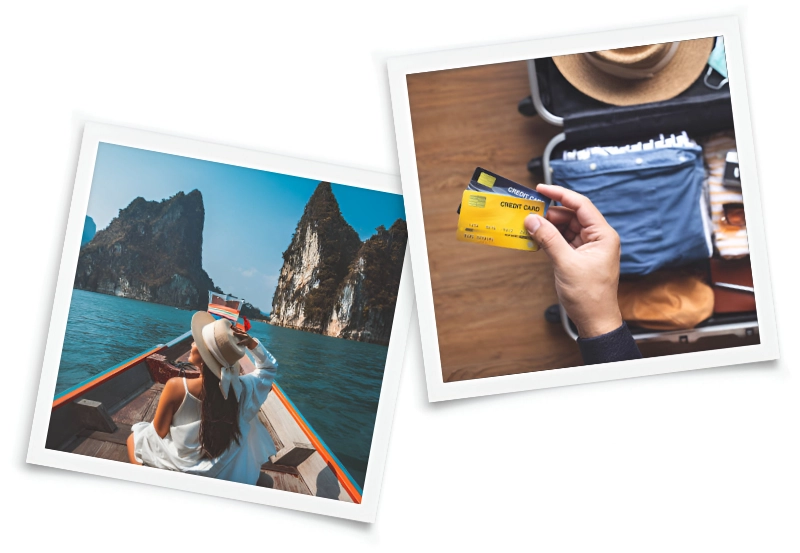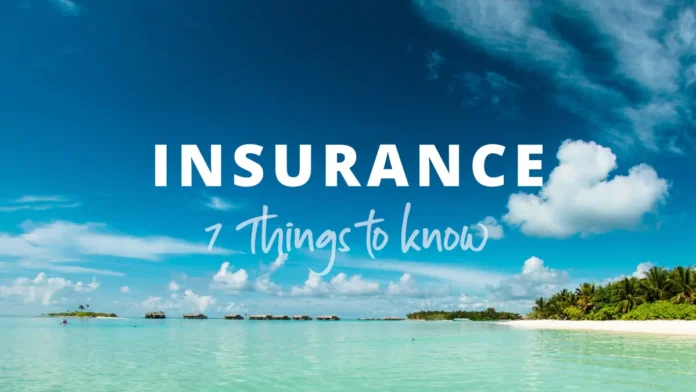Suppose you planned a perfect getaway: the tickets are booked an itinerary is set and excitement is sky-high. Then that dreaded thing happens—a sudden illness, a family emergency, or maybe some far-off global event messes up the plan entirely. That’s where travel insurance turns a possible financial disaster into a mere pesky nuisance.
Recent events have proved just how unpredictable it is to travel. For example, the COVID-19 pandemic saw many travelers witness exorbitant charges levied against cancellations. As a matter of fact, huge surges in policy purchases and claims reportedly supported an increasingly important awareness of the unpredictability of traveling according to the U.S. Travel Insurance Association. But is travel insurance right for everybody? Insiders maintain it is not. Everything from the price of your trip to your personal risk tolerance can come into play when making a decision. Say a short and relatively inexpensive domestic jaunt might not be worth the extra expense, but the stakes will be so much higher with that $20,000 dream vacation to some exotic place.
In such cases, just the peace of mind could be worth it, particularly to all those people who tend to stay ahead of the game regarding ‘what ifs.’

How to Assess Your Travel Insurance Needs
Buying travel insurance is much like packing a suitcase: what you need is where you go and what you’re doing. To some, it was a no-brainer—insurance was required to protect against some kind of potentially disastrous turn of events that can upset even the most carefully made plans. Whereas for others—in fact, for many who are on short, cheap trips—it was an extra expense they didn’t need to make.
First, evaluate the financial risk of your trip. How much have you already paid out in non-refundable tickets, hotel bookings, and tours? For example, a road trip to a nearby national park for the weekend where little money has been pre-paid would not call for buying insurance. But a luxury European cruise costing more than $20,000—well, in that case, the financial risk is much greater.
And finally, of course, there’s your own personal risk tolerance: do you like the gamble, or would you spend the whole time of the trip fretting about what could go wrong? To many people, the peace of mind brought about by insurance well and truly outweighs that. They can really enjoy their adventure knowing they are covered in case anything should go wrong.

Travel Insurance: How to Know the Difference
It is not a product; it is very varied in market segmentation, targeting different kinds of travel, aiming at the needs of travelers. Your choice for travel will be ideal if you know the many forms of coverage that exist out there.
1. Trip Cancellation and Interruption Insurance
This covers, by a very long shot, the number of claims for money lost in case one has to cancel or interrupt a trip due to contingencies such as illness or the demise of an immediate family member. Realize that standard policies will probably not allow claims related to a global pandemic.
2. Medical Coverage
It covers the medical expenses one incurs while on a trip. Medical cover is a must during tours to most remote and other areas with high risks and substandard medical facilities.
3. Emergency Evacuation Coverage
Transportation to a suitable medical facility or home if one becomes seriously sick or injured. In many of those worst-case scenarios, this costs over more than $100,000—the ultimate lifesaving benefit.
4. Baggage and Personal Effects
Lost luggage? Camera stolen? This insurance covers against lost, stolen, or damaged personal effects, so that you are not out of pocket should you need to replace valuable items.
5. Trip delay insurance
covers any extra expenditure on travel and accommodation made due to flight delays or because of some or other natural calamity.
6. Specialty Coverage
Specialty coverage provides insurance for car rentals, hazardous activities such as scuba diving, and even geopolitical evacuations from unruly foreign countries.

Insurance cost for travel
Think of the travel insurance as a pittance paid for huge peace of mind. Generally speaking, travel insurance will run you somewhere between 5% and 12% of the overall cost of your trip. But therein is the devil in the details: several variables can make this figure range as great as any of those destinations you may go to.
When it comes to insurance premiums, age is more than just a number. The older a traveler gets, the higher the premium will be because insurance providers believe such individuals present a higher risk. In fact, there exist situations where people above the age of 50 pay very high premiums compared to young travelers.
The length and cost of your trip also plays a critical role. A two-week luxury safari may be more expensive to insure than a budget-friendly long weekend in Cancun. Why? Because the potential financial loss is so much higher with more expensive trips.
It’s also going to ding your bottom line, depending on the level of coverage you choose. You can get “cancel for any reason” coverage, but it can add another 40 percent to the cost—for arguably the best flexibility and reimbursement.

When to Buy Travel Insurance:
Timing isn’t just everything in comedy, but also when buying travel insurance. Though many travelers believe that you must purchase insurance the very moment you book your trip, well that simply is not the case—the good news is you do have some flexibility as to how and when you might protect your travels.
However, optimum timings could be envisaged as below:
- Best coverage: Buy as soon as you put down your first trip deposit. You’ll be covered for events that might force you to cancel in the meantime, like tour operator bankruptcies or sudden changes in health.
- Pre-Existing Illness Cover: Most policies offer cover under the pre-existing medical condition only if you buy the insurance within a certain period, say 14 to 21 days from the time you made your initial booking.
- Besides, some forms of travel insurance, such as cancellation insurance, will be all the more useful when bought well in advance. For instance, if you were able to call off your trip six months in advance; you would thank your stars for being so farsighted.
- But for those of you who, like many people, only do things at the last minute, most policies can be bought right up until the day before you go. Just remember that buying too late often means you have to give up some of the benefits—most noticeably the pre-existing and long-term cancellation.

Detailed Overview of Medical Coverage
Not to forget the health coverage in respect of traveling, especially abroad: an accident or diseases may occur at any time, and if no proper insurance is available, then financial and emotional tensions will increase. Hence, the medical coverage under travel insurance will work out as your financial protector in paying for those expenses that increase in a very quick manner in foreign hospitals.
What does it normally cover? Most of the travel insurance covers hospital stay cost, physician services, and emergency medical procedure. But it’s not just having any medical coverage that matters; rather, it’s all about the right kind. Say, for example, going deep into some of the most inaccessible parts of the world—for instance, trekking the Himalayas or even exploring the jungles of the Amazon—should have access to emergency medical evacuation procedures, which cost upwards of $100,000.
However, most visitors don’t consider that their health insurance beyond their border doesn’t exist. If your policy covers you abroad, as is often the case, it provides reimbursement at out-of-network rates, leaving you with huge bills. Therefore, it is vital that you call your home insurance company and find out what you’re covered for before leaving.

Credit Card Travel Benefits: Alternative to Insurance
Those who are well-seasoned travelers often overlook the powerful benefits that might come along with high-level credit cards. Some credit cards offer travel insurance-like benefits which may suitably replace or at least significantly supplement traditional travel insurance policies.
Consider, for example, how highly the Chase Sapphire Reserve ranks among travelers due to its all-inclusive travel protection features:
- Up to $3,000 lost luggage reimbursement per passenger.
- Compensation for trip delay: up to $500 for delays in excess of six hours.
- Emergency medical and dental benefit: US$2,500 covering the medical expenditure abroad.
It also involves protection in the event of an accident during travel, emergency evacuation, and transportation, very vital in fatal circumstances.
These benefits may be adequate to consider regular travel insurance for short trips or even longer international journeys that do not present any high medical risk. Indeed, the greatest advantage that can possibly be derived from the use of credit card benefits may be in the cost: it is there attached to your card’s annual fee and can be much more economical than buying a separate policy every time you travel.
It’s in the fine print, however, that things catch. Benefits most definitely vary a great deal more between different issuers and cards, and such benefits more often than not have their own limits and exclusions not so obvious upon sight. In the case of the aforementioned example, coverage might apply only if you actually paid for your trip using the card. Maximum coverage may be a lot less in comparison with an actual travel insurance policy.

Personal Decision: To Buy or Not to Buy Travel Insurance
The purchase of travel insurance is a very personal decision, with answers likely to fall all over the map depending on individual circumstances. This is more than just weighing a cost-benefit balance of risk appetite, personal travel needs, and resultant peace of mind derived from insurance.
Reflect on your travel history and habit: normally are your travels pretty smooth, or do you encounter snags? You may not need to take a policy if your trips are barely disrupted, and this one doesn’t seem particularly high-risk. But let’s put it into perspective: in recent surveys, nearly 22% said travel insurance saved them from some pretty unexpected financial stress. That really says much about the craziness of traveling and how nice a safety net would be.
Consider the nature of your travel: is this a lifetime adventure for you, like an African safari, or is this a very important business journey in which timing is of the essence? A major investment or critical traveling makes the insurance more than just a safety net; it’s a building block of traveling.
Assess your current coverages: As above, many credit cards feature some pretty amazing-sounding travel coverages that could be sufficient for shorter or less-risky journeys. Most of those benefits have some fairly significant limitations, though—especially in the amount and breadth of coverage.

Conclusion
It is all about buying travel insurance—worst that can happen—being sure of cover and assurance as you globe trot. All the way from knowing the many types of coverage available and their relative cost, when one should actually buy travel insurance, to finally the personal decision on which type of insurance to invest in—the right decision really depends upon the type of traveler. By nature, travel is greatly about discovery and sometimes about uncertainty. Knowing that 17% of Americans say travel insurance has helped them deal with a medical emergency abroad, and more use the insurance at times of global disruptions such as a pandemic, sets the place of travel insurance in managing such uncertainty within the global adventure. Therefore, take a little time before embarking on this journey to reflect on what your needs are, balance those options, and make decisions on whether insurance is the traveling companion for your next adventure. The best travel plan you could ever have is one in which you can be assured of your safety and financial security wherever the travels may take you.

